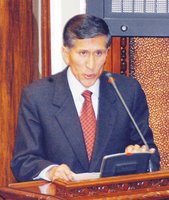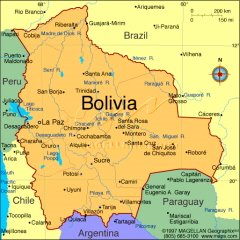Nationalization Delayed, Bolivia Takes Smaller Steps on Hydrocarbons
The much anticipated plan for nationalizing hydrocarbons will be delayed “some weeks” according to Alex Contreras, spokesman for President Evo Morales. This statement follows an announcement last week that the Bolivian government will not nationalize Andina, a local subsidiary of Spanish energy
giant Repsol.
Both represent major obstacles in the country’s aim to nationalize its oil and gas reserves. Elected on a platform that promised nationalization of the country’s resources, the new government is taking a number of different tactics to reach that goal.
In late March the Bolivian government filed charges against three former presidents, eight former energy ministers, and arrested two business executives - all in conjunction with inappropriate oil and gas dealings.
Former presidents Carlos Mesa, Gonzalo Sanchez de Lozada, and Jorge Quiroga are charged with violating the country’s constitution by signing lucrative contracts without congressional approval.
Bolivian Attorney General Pedro Gareca announced his discovery of 44 illegal contracts signed by the former presidents with foreign oil firms between 1993 and 2003.
In addition, last month’s arrest of Julio Gavito and Pedro Sanchez has put increased pressure on multinational companies operating in Bolivia.

The two Repsol executives - who were each released on $50,000 bail - face charges that their company smuggled $9.22 million worth of oil between 2004 and 2005. Gavito - president of Bolivia’s state-run Yacimientos Petroliferos Fiscales Bolivieros (YPFB) and also Vice President of Andina - recently resigned claiming “personal reasons”. Sanchez will remain as the Chief Operating Officer of Repsol YPF Bolivia. If convicted they are facing charges of three to six years.
Beyond the legal pinch, multinationals are feeling an economic squeeze as the Morales government demands back taxes as well as higher royalties.
Last week the Bolivian government announced a claim of $40 million in back taxes from oil and gas companies that are currently doing business in Bolivia. The amount could be worth as much as $200 million if penalties and administrative fees are calculated. Multinationals have appealed the decision to Bolivia’s Supreme Court.
This is the latest tool to be used as the government moves to renegotiate oil and gas contracts with companies from Europe and Latin America.
In late March, France's Total SA announced that it will pay an increased tax on oil exports from Bolivia. The new tax levy will increase royalties from 34 percent to 50 percent. Total SA also announced it had established a partnership to develop new gas fields with YPFB.
In contrast Petroleo Brasilerio SA chief executive Sergio Gabrielli declared that the company's future in Bolivia is uncertain. This amid recent demands that Brazil pay increased prices for natural gas.
Gabrielli's comment was prompted by disagreement with Bolivia’s hydrocarbon plans as well as statements made by Bolivian Hydrocarbons Minister Andres Soliz.
Soliz has accused Brazil of taking a tough stance on renegotiating gas purchases and exerting geopolitical pressure on the nation. In February Petrobras presented the new government with an investment plan worth US$5 billion. It has since declared a halt on all future investment.
Petrobras has invested over US$1.5 billion in Bolivia since 1996. Foreign oil and gas companies such as Britian’s BG and BP, Spanish-Argentine Repsol YFP SA, France's Total SA and U.S.’s Exxon Mobil Corporation have invested $3.5 billion in Bolivia since privatization was implemented in the 1990’s.
But many Bolivians will not be happy until multi-nationals are taken over by the government or expelled. Bolivian labor leader Felix Muruchi states that many residents in the poor city of El Alto want to see full nationalization of the nation’s resources that includes kicking out the multi-national corporations.
Last week Morales formally announced that Bolivia will not nationalize Re psol's local subsidiary, Andina. The cash-strapped government is not willing to assume a $57 million debt in order to take over the company. According to Soliz, Andina's debts reach a total of $177 million although its book value is only $120 million.
psol's local subsidiary, Andina. The cash-strapped government is not willing to assume a $57 million debt in order to take over the company. According to Soliz, Andina's debts reach a total of $177 million although its book value is only $120 million.
The new government must also contend with past contracts like those that put Brazil's Petrobras in control of 95% of Bolivia’s refining capacity. Brazil also owns a pipeline as well as 25% of the Bolivia's gas stations.
These type of arrangements represent some of the disproportinate influence that multinational companies have had in a country that is rich in natural resources but poor in economic development.
Planning Minister Carlos Villegas has stated “It’ll be a gradual process. We don’t want extreme or abrupt measures, or shocks which only generate uncertainty”.
Last week’s announcements demonstrate that the ability to "dismantle colonialism and neoliberalism" may be easier in theory than in practice.
Nationalization has been identified as a key issue that could drive a wedge between Morales and his MAS supporters. Critics of Morales contend that his government has yet to show how nationalization will work.
Yet his administration appears willing to use both economic and judicial methods as it moves towards the nationalization of all the country's hydrocarbons by July 12.
giant Repsol.
Both represent major obstacles in the country’s aim to nationalize its oil and gas reserves. Elected on a platform that promised nationalization of the country’s resources, the new government is taking a number of different tactics to reach that goal.
In late March the Bolivian government filed charges against three former presidents, eight former energy ministers, and arrested two business executives - all in conjunction with inappropriate oil and gas dealings.
Former presidents Carlos Mesa, Gonzalo Sanchez de Lozada, and Jorge Quiroga are charged with violating the country’s constitution by signing lucrative contracts without congressional approval.
Bolivian Attorney General Pedro Gareca announced his discovery of 44 illegal contracts signed by the former presidents with foreign oil firms between 1993 and 2003.
In addition, last month’s arrest of Julio Gavito and Pedro Sanchez has put increased pressure on multinational companies operating in Bolivia.

The two Repsol executives - who were each released on $50,000 bail - face charges that their company smuggled $9.22 million worth of oil between 2004 and 2005. Gavito - president of Bolivia’s state-run Yacimientos Petroliferos Fiscales Bolivieros (YPFB) and also Vice President of Andina - recently resigned claiming “personal reasons”. Sanchez will remain as the Chief Operating Officer of Repsol YPF Bolivia. If convicted they are facing charges of three to six years.
Beyond the legal pinch, multinationals are feeling an economic squeeze as the Morales government demands back taxes as well as higher royalties.
Last week the Bolivian government announced a claim of $40 million in back taxes from oil and gas companies that are currently doing business in Bolivia. The amount could be worth as much as $200 million if penalties and administrative fees are calculated. Multinationals have appealed the decision to Bolivia’s Supreme Court.
This is the latest tool to be used as the government moves to renegotiate oil and gas contracts with companies from Europe and Latin America.
In late March, France's Total SA announced that it will pay an increased tax on oil exports from Bolivia. The new tax levy will increase royalties from 34 percent to 50 percent. Total SA also announced it had established a partnership to develop new gas fields with YPFB.
In contrast Petroleo Brasilerio SA chief executive Sergio Gabrielli declared that the company's future in Bolivia is uncertain. This amid recent demands that Brazil pay increased prices for natural gas.
Gabrielli's comment was prompted by disagreement with Bolivia’s hydrocarbon plans as well as statements made by Bolivian Hydrocarbons Minister Andres Soliz.
Soliz has accused Brazil of taking a tough stance on renegotiating gas purchases and exerting geopolitical pressure on the nation. In February Petrobras presented the new government with an investment plan worth US$5 billion. It has since declared a halt on all future investment.
Petrobras has invested over US$1.5 billion in Bolivia since 1996. Foreign oil and gas companies such as Britian’s BG and BP, Spanish-Argentine Repsol YFP SA, France's Total SA and U.S.’s Exxon Mobil Corporation have invested $3.5 billion in Bolivia since privatization was implemented in the 1990’s.
But many Bolivians will not be happy until multi-nationals are taken over by the government or expelled. Bolivian labor leader Felix Muruchi states that many residents in the poor city of El Alto want to see full nationalization of the nation’s resources that includes kicking out the multi-national corporations.
Last week Morales formally announced that Bolivia will not nationalize Re
 psol's local subsidiary, Andina. The cash-strapped government is not willing to assume a $57 million debt in order to take over the company. According to Soliz, Andina's debts reach a total of $177 million although its book value is only $120 million.
psol's local subsidiary, Andina. The cash-strapped government is not willing to assume a $57 million debt in order to take over the company. According to Soliz, Andina's debts reach a total of $177 million although its book value is only $120 million.The new government must also contend with past contracts like those that put Brazil's Petrobras in control of 95% of Bolivia’s refining capacity. Brazil also owns a pipeline as well as 25% of the Bolivia's gas stations.
These type of arrangements represent some of the disproportinate influence that multinational companies have had in a country that is rich in natural resources but poor in economic development.
Planning Minister Carlos Villegas has stated “It’ll be a gradual process. We don’t want extreme or abrupt measures, or shocks which only generate uncertainty”.
Last week’s announcements demonstrate that the ability to "dismantle colonialism and neoliberalism" may be easier in theory than in practice.
Nationalization has been identified as a key issue that could drive a wedge between Morales and his MAS supporters. Critics of Morales contend that his government has yet to show how nationalization will work.
Yet his administration appears willing to use both economic and judicial methods as it moves towards the nationalization of all the country's hydrocarbons by July 12.



0 Comments:
Post a Comment
<< Home